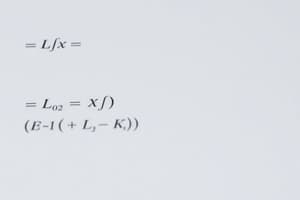Podcast
Questions and Answers
What is the main purpose of finding the slope of a tangent line to a curve?
What is the main purpose of finding the slope of a tangent line to a curve?
- Determining the maximum or minimum points of a function
- Finding areas under curves
- Describing motion in physics
- Computing the rate of change of a physical quantity (correct)
How are integrals different from derivatives?
How are integrals different from derivatives?
- Integrals help find the maximum or minimum points of a function (correct)
- Integrals measure change over an interval
- Derivatives help find the total change or accumulation of a function
- Derivatives are represented using the ∫ notation
What is a key application of calculus in physics?
What is a key application of calculus in physics?
- Deriving Newton's laws of motion (correct)
- Analyzing systems in biology
- Creating mathematical models in engineering
- Solving optimization problems
Which field uses integral equations to model real-world phenomena?
Which field uses integral equations to model real-world phenomena?
What is a common use of differential equations?
What is a common use of differential equations?
Why is calculus considered a powerful tool in various disciplines?
Why is calculus considered a powerful tool in various disciplines?
What is a limit in calculus?
What is a limit in calculus?
What is continuity in calculus?
What is continuity in calculus?
How is a derivative defined in calculus?
How is a derivative defined in calculus?
Which concept allows us to define derivatives and integrals?
Which concept allows us to define derivatives and integrals?
What does continuity ensure for a function in calculus?
What does continuity ensure for a function in calculus?
How are derivatives frequently represented in calculus?
How are derivatives frequently represented in calculus?
Flashcards are hidden until you start studying
Study Notes
Mathematics: Exploring Calculus
Calculus, a cornerstone of modern mathematics, is a field that deals with change and the rates of change. It's a powerful tool that helps us navigate the complexities of the natural world and gain a deeper understanding of phenomena like motion, growth, and optimization. This article will dive into the concepts that make calculus such a profound and transformative subject.
Limits and Continuity
Calculus is built on the foundations of limits and continuity. A limit is the value a function approaches as it gets closer to a specific input. For instance, the limit of 1/x as x approaches 0 is 0. This concept is crucial, as it allows us to define the derivative and integral of a function.
Continuity is the property of a function that does not have any abrupt jumps or gaps. In other words, a continuous function doesn't change direction or value abruptly when moving along its graph. Continuity is a necessary condition for the existence of derivatives and integrals.
Derivatives
A derivative, also called the rate of change or slope of a function, measures the instantaneous change in the function's value with respect to changes in its inputs. Derivatives are frequently represented using the f'(x) notation, where f'(x) denotes the derivative of the function f(x).
The derivative has numerous practical applications. It helps us find the slope of a tangent line to a curve, determine the maximum or minimum points of a function (also known as critical points), and compute the rate of change of a physical quantity.
Integrals
Integrals, on the other hand, are the opposite of derivatives. Instead of measuring change, they help us find the total change or accumulation of a function over an interval. Integrals are represented using the ∫ f(x) dx notation.
Integrals are essential for finding areas under curves, volumes of solids, and the total distance traveled by an object. They're also crucial in computing the average value of a function over a specific interval and solving various optimization problems.
Applications in Physics and Engineering
Calculus has numerous applications in the fields of physics and engineering. In physics, calculus is used to describe motion, force, and energy. For example, calculus is used to derive Newton's laws of motion and the laws of conservation of energy and momentum. In engineering, calculus is used to create mathematical models, analyze systems, and design structures.
Differential and Integral Equations
Differential equations are equations that involve derivatives of functions. Integral equations, on the other hand, involve integrals of functions. Both types of equations are used to model various real-world phenomena and solve complex problems in a wide range of disciplines, including physics, engineering, economics, and biology.
Conclusion
Calculus is a powerful and versatile tool that provides deep insights into the complexities of our world. It helps us understand and quantify change, enabling us to solve a wide range of problems in physics, engineering, economics, and other disciplines. By studying calculus, you will develop a deep understanding of functions, their behavior, and their applications. As you delve deeper into this subject, you will uncover its beauty and practicality, and discover the many ways it can enrich your life and career.
Studying That Suits You
Use AI to generate personalized quizzes and flashcards to suit your learning preferences.




